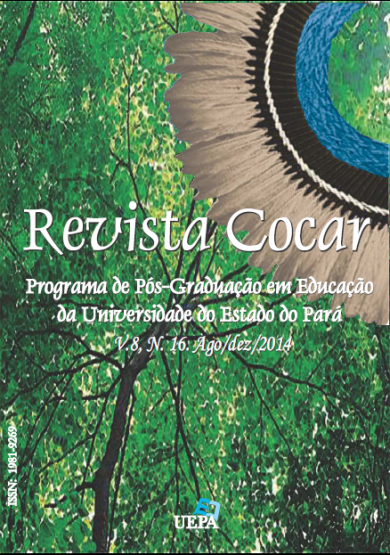Territórios insulares: saberes e práticas socioambientais cotidianos
Resumo
Trata o presente trabalho de um conjunto de práticas socioculturais que informam o cotidiano de uma comunidade insular, cuja existência de uma territorialidade ancestral se efetiva por meio de uma diversidade de saberes culturais locais. Visa ao conhecimento, à compreensão desses saberes que são construídos e/ou vivenciados no cotidiano de homens e mulheres na sua relação com a biodiversidade. Assume como pressuposto que a maioria das comunidades rurais-ribeirinhas, no contexto da Amazônia paraense, embora enfrente cotidianamente uma realidade marcada por condições adversas, constrói, na relação com a natureza, estratégias sociais que garantem sua reprodução material e simbólica. Orientou-se pela seguinte questão- contexto: Como se estabelece a relação entre os saberes culturais locais que dinamizam as práticas sociais cotidianas de uma territorialidade ancestral e os processos de apropriação e uso de recursos naturais e que efeitos têm para efetivação de perspectivas mais sustentáveis localmente e valorização da biodiversidade? Esta pesquisa abrange a Comunidade de Igarapé Grande, na Ilha de João Pilatos, que integra a "região insular" do município de Ananindeua, Região Metropolitana de Belém, estado do Pará. Utilizou-se procedimentos da pesquisa etnográfica, como a observação participante, entrevista semiestruturada e etnofotografia. Fundamenta-se teoricamente em fontes de estudo que tratam e refletem sobre as possibilidades de construção de novas epistemologias que deem conta dos saberes e práticas culturais locais. Os resultados dão conta de uma série de problemas socioambientais; da preocupação local com a manutenção de boas condições ambientais; de um vasto conhecimento de usos de plantas e ervas medicinais, dentre outros. Conclui-se que, pautados em saberes locais, os moradores desenvolvem práticas socioambientais que buscam dar sustentabilidade local e continuidade aos seus modos de vida e costumes.
Palavras-chave: Saberes culturais. Territorialidades ancestrais. Comunidade insular. Biodiversidade."
Insular territories: daily knowledge and environmental practices"
This paper deals with a set of socio-cultural practices which report the daily life of an insular community whose existence of an ancestral territoriality is accomplished by means of a diversity of local cultural knowledge. It aims at knowing and comprehending this knowledge built and/or experienced in the daily lives of men and women in their relationship to biodiversity. The premise is that the majority of the rural-riverine communities in the context of the Paraense Amazon, although facing daily the reality marked by adverse conditions, build, in their relation to the nature, social strategies which ensure their symbolic and material reproduction. This work was guided by the following question-context: How is established the relation between the local cultural knowledge that estimulates the daily social practices of an ancestral territoriality and the processes of appropriation and use of natural resources and what effects do they have to the execution of more sustainable perspectives and enhancement of biodiversity? This research encompasses the Community of Igarapé Grande, in the João Pilatos island, part of the "insular region" of Ananindeua, metropolitan region of Belém, Pará state. It was used procedures of ethnographic research, such as participant observation, semi-structured interviews and ethno-photography. It is theoretically based on sources of study which deal with and reflect on the possibilities of constructing new episthemologies regard to local knowledge and cultural practices. The results point to many social-environmental problems; local concern with keeping good environmental conditions; a vast knowledge regarding plants usage and medicinal herbs, among others. It is concluded that, grounded on local knowledge, residents develop socio-environmental practices that aim at giving local sustainability and continuity to their ways of life and customs.
Keywords: Cultural knowledge. Ancestral territoriality. Insular community. Biodiversivity.
Downloads
Downloads
Publicado
- Visualizações do Artigo 457
- PDF downloads: 442























